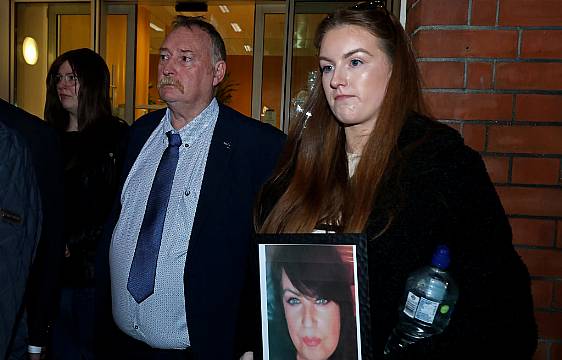A hospital has issued an apology over the death of a Mayo woman who died a few hours after laboratory staff failed to escalate abnormal blood test results in line with established procedures which would have alerted doctors to significant postoperative bleeding in the patient.
A verdict of medical misadventure was returned in the death of Eilis Cronin-Walsh (49) at St Vincent’s University Hospital on October 17th, 2021.
A sitting of Dublin District Coroner’s Court on Tuesday heard the mother of four from Convent Hill Crescent, Ballina, Co Mayo died from hypovolemic shock due to acute intra-abdominal bleeding.
Susan Aherne, a pathologist who carried out a postmortem on the deceased, estimated Ms had lost around 1.5 litres of blood.
Dr Aherne said the bleeding was linked to an infection which arose following an operation on the patient.
Ms Cronin-Walsh had undergone surgery nine days earlier to remove a pancreatic tumour as well as her gallbladder and spleen.
The inquest heard laboratory staff had tried calling her hospital ward shortly after midday on October 17th, 2021 with test results which should have triggered an immediate intervention by doctors but got no response.
The critical finding of the test was only first noticed by staff nurse, Priya Jacob, at 7pm that evening who immediately alerted doctors to the patient’s critical condition.
Coroner Aisling Gannon heard Ms Cronin-Walsh became unresponsive a short time later before suffering a fatal cardiac arrest and being pronounced dead at 9:19pm.
SVUH laboratory manager, Donal Murphy, told the inquest that the results of the blood test had been available from 12:05pm that day.
Mr Murphy said laboratory staff had tried to phone two extensions in the patient’s ward but got no answer.
He admitted that procedures to escalate critical findings to on-call doctors, where calls are not answered, were not followed.
Mr Murphy said procedures had been reviewed and updated since Ms Cronin-Walsh’s death with all staff being retrained about the communication of critical results.
Patient's ward
Cross-examined by counsel for the deceased’s family, Joe Brolly BL, he estimated the laboratory was about a five-minute walk from the patient’s ward.
The deceased’s husband, James Walsh, gave evidence that his wife was getting sick with a lot of bile on the day before she died, while her stomach was “swollen like a balloon.”
As he was leaving the hospital, Mr Walsh said his wife said she was not going to make it as her body was telling her she was dying.
Mr Walsh said he replied: “Don’t talk like that. You’ll be fine.”
He recalled that he was unable to contact the hospital ward where she was staying at any time the following day until he was informed that evening that she had died.
Mr Walsh criticised the aftercare provided by SVUH to his wife in the week after her surgery, including one occasion when it took an hour until someone came to help her go to the toilet.
“To leave someone that length after a major operation is unbelievable,” said Mr Walsh.
He claimed it was difficult to get through to his wife’s ward and every time he did, he was reassured she was OK.
Consultant surgeon, Donal Maguire, said the patient’s low haemoglobin count on the morning of her death should have triggered interventions to deal with the internal bleeding.
Mr Maguire said she should also have been cared for in a specialist ward rather than one where there was no special expertise.
He claimed her gallbladder was incredibly inflamed but her postoperative recovery was “pretty much as expected,” although it had been difficult to control her postoperative pain.
The inquest heard the patient had a CT scan on October 13th, 2021 which showed an intra-abdominal collection of fluid and she had a drain inserted which removed 750ml of pus the following day.
Blood tests
The consultant said there had been no follow-up by the hospital’s laboratory staff after their calls to the patient’s wards about the blood test results had gone unanswered.
Mr Maguire explained that the protocol stipulated that laboratory staff should contact on-call medical staff or the surgical consultant responsible for the patient if they failed to get to the ward.
“They did not adhere to this protocol and this low haemoglobin was not brought to anybody’s attention,” he admitted.
In reply to questions from the coroner, Mr Maguire said the patient’s surgery was “a bit more complicated” than normal because of her gallbladder, which he described as “one big area of pus and infection.”
He claimed the chronically infected organ was the single biggest factor in her death.
Mr Maguire said he had anticipated that the patient would have a postoperative intra-abdominal infection, but her recovery was progressing in line with expectations.
The surgeon said he would have expected that the patient’s haemoglobin would have been checked on October 16th, 2021, but it was not done.
At the same time, he claimed no other medical checks that day had indicated any problem with her vital signs.
He believed that Ms Cronin-Walsh must have suffered a major internal bleed during the night before her death.
SVUH’s clinical risk and patient safety manager, Orla Kenny, outlined improved patient care introduced in the hospital in recent years including a new pathway for managing complex patients undergoing surgery on the liver, pancreas or gallbladder post-operatively.
Other measures included the appointment of a clinical nurse manager for deteriorating patients and bimonthly workshops on the identification and care of such patients.
Mr Brolly observed that the most alarming aspect of the death of a “fit, healthy woman” was the failure to communicate the results of her critical blood test results, which had resulted in a fatal delay of seven hours.
However, he welcomed the extensive improvements made by the hospital following her death and said Ms Cronin-Walsh’s family were grateful for the changes.
“The hospital responded in an outstanding way to this tragedy,” he remarked.
At the end of the inquest, counsel for SVUH, Caoimhe Daly BL, issued a sincere apology on behalf of the hospital for its failure in the care of the deceased which has resulted in her unexpected death.
Ms Daly said the hospital recognised the ongoing sadness and distress suffered by her family and stated it was committed to learning from the case.
She said changes had been implemented to improve patient care and training in order to prevent a recurrence.
Speaking after the hearing, the deceased’s son, Kevin Walsh, acknowledged the hospital’s apology and the changes made since his mother’s death.

“I hope no other family has to go through this in the future,” said Mr Walsh.
“Eilis was a wonderful mum and a great human being. It’s sad to see such a lovely person die so young,” he added.
The family’s solicitor, David O’Malley of Callan Tansey Solicitors, said the verdict of medical misadventure was important as Ms Cronin-Walsh’s death appeared to have been avoidable.
“Hopefully, lessons can be learnt from the recommendations in the future,” said Mr O’Malley.







